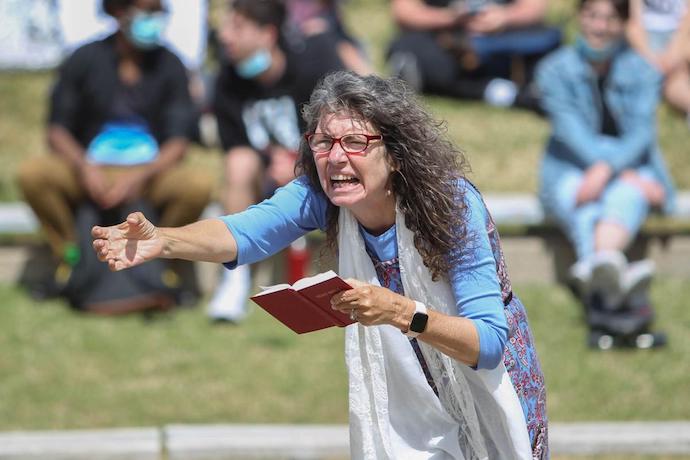Sister Cindy, 40-year campus ministry veteran and now darling of ironic Gen Z TikTok, visited Butler University recently. Earlier in the day, she’d projected a 3:30 pm arrival, and within minutes of the announcement half a dozen students in a class I teach at the same time had emailed me, many in breathless all-caps, asking if they could attend.
They knew I’d say yes. It was a beautiful spring day during the last full week of classes at the end of the great Covid school year coop-up. More importantly, the course considered issues of religion, (in)tolerance, and free speech, and we had discussed Cindy’s bombastic preaching earlier in the semester. Fully vaccinated, I offered, in lieu of class, to livestream the sermon for the few students who didn’t plan to attend.
Around two hundred people came out to meet her (all of them masked, so far as I could tell—huzzah, Butler students!). Running through her greatest hits—if you’ve seen one online video, you’ve seen them all—she howled at the female students to be “hos no mo,” mocked lesbians, condemned those who viewed “the porn,” and berated the ostensibly insufficient masculinity of “titty-whipped” boys. My students anticipated and rose in chorus to help her complete her oft-memed catchphrases.
I sat in the front row, rather ineffectively trying to capture video and sound of sufficient quality for the students joining the “class” remotely, and trying to understand what in literal tarnation was going on.
Our student body is slightly left of center, religiously and politically speaking, and most would reject Cindy’s conservative morality. Still, instead of protesting or being offended by her castigations, they revelled in loudly admitting to being the profligate sinners Cindy accused them of being. They embraced her denunciatory labels as badges of honor. Some queer students watched with apparent good humor as she condemned their sexual orientation. Several Jewish students cheered as she declared they could only avoid eternal torture by converting to Christ (which she declared “the most Jewish thing” they could do). Tri Delta sisters came out en masse, screeching with pleasure when Brother Jed (Cindy’s husband and cut-rate collaborator) declared theirs his favorite of the “so-whore-ities.”

SNL’s Dana Carvey as “The Church Lady” in the late ’80s. It really was special.
Cars drove by honking their horns, peeling out, and blasting that most famous of Cardi B. and Megan Thee Stallion duets. Cindy knew the song, and without missing a beat decried the collegiate obsession with WAPs (though Cindy, clutching no pearls, did not use the acronym). It was a carnival, a freak show, as hysterical for this generation as SNL’s Church Lady was for mine. Except this time, the church lady was the butt of her own self-inflicted joke.
At least sort of.
On the one hand, this is the generation that began in historically large numbers to leave institutional religion behind and embrace the eclectic, episodic, “spiritual but not religious” life that Melinda Lundquist Denton and Richard Flory call “back-pocket” religion. And that, of course, is if they’re religious at all. Many no longer are, and are therefore in equally historic numbers flooding the agnostic, atheist, and “unaffiliated” (or religious “none”) categories of Pew’s regular Religious Landscape Study.
The fascination that at least some of them have with Sister Cindy is therefore of the morbid variety. It’s for the same reason that we find it harder and harder to fill certain kinds of religion courses at our secular university. Maybe, if you’re lucky, you can get enough students enrolled in “History of Christianity” to keep administrators from canceling your course. But put “Jonestown” in the course description? You’ll pack the house, and your students will come to class having watched more Jonestown documentaries than you. (Jim Jones is Butler’s most famous former student, but for some reason our marketing materials don’t mention it.)
On the other hand, however, many of these same students positively love Sister Cindy, and not purely for the entertainment value. One pious Christian student had Cindy sign her Bible, and many stuck around long afterward for photo ops with the evangelist. Overwhelmingly, my students judge her a true believer who sincerely desires to spread her brand of Christianity and convert college students to Christ.
They respect the commitment, even if they want nothing to do with it. To them, Sister Cindy is like a kind but conservative and conspiracy-loving aunt. Silly and misguided, perhaps, but, because of her advanced age, becoming rapidly irrelevant, and so ultimately harmless and loveable (at least if she’s nice to people and doesn’t vote).
Perhaps, then, their attitude towards Sister Cindy reflects shifting attitudes about religion itself. But if so, what does this mean for religion? Jed and Cindy portray the mocking responses of their audiences in the terms of spiritual warfare, as a demonic reaction to the power of God’s Word. But is there any real power left in religion if even many among the pious consider the idea that we should be deferential to religious institutions in matters of belief and behavior (that is, that we should allow ourselves to be disciplined by them, to use Foucauldian language) too quaint and irrelevant to take seriously?
Cindy and Jed cut their campus ministry teeth in the 1970s, when college preachers vigorously debated atheists, socialists, feminists, and more. But what’s the purpose of such debate for the generation that believes “everyone goes to heaven” and “it’s all good” (meaning people can believe whatever they want as long as they aren’t hurting others)? There’s no reason to be offended or engage in debate if religion is merely a matter of opinion (the current manifestation of a long trend my colleague, Brent Hege, traces back through American history to Thomas Jefferson, and which we might trace back even further to what Manuel Vasquez calls the Protestant “excarnation.”
Mind you, this is not some conservative plea for a return to traditional religion, though I do think thoughtful conservative religious people would likely be concerned to discover—to use Christian language—that the scandal of the gospel has largely lost the power to scandalize (an enervation for which they themselves are, in my view, largely responsible). And if religion indeed no longer has this power, then we may perhaps imagine that religion of the kind that made real claims on and demands of people is heading, like that elderly aunt, rather headlong into oblivion. It may be that the world will be a better place when it’s gone, but it may also be that we come to miss it deeply.
***
Acknowledgements: This essay was written very much in community. Thanks to colleagues Kate Blanchard, Nora Rubel, Brent Hege, Richard Flory, Megan Grady, Peter Wang, and James McGrath, as well as students in that aforementioned course, particularly Katie Stanley and Kylie Wagner, for their encouragement and suggestions.





